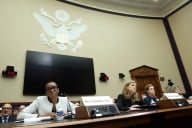You have /5 articles left.
Sign up for a free account or log in.
Washington University in St. Louis last week announced that it will from now on let applicants self-report their test scores on the SAT or ACT, rather than having testing agencies submit official records. Only when an applicant has been admitted and decides to enroll will they be required to have an official record sent.
Wash U joins about 25 other colleges that allow applicants to submit their own scores. The move appears to be gaining favor at colleges that are competitive in admissions. Colby College and the University of Chicago announced such shifts last year.
Why is the idea gaining favor?
Both the College Board and the ACT grant fee waivers, and those waivers include the right to send a limited number of score reports to colleges. The College Board, for example, lets those who receive waivers send four reports shortly after taking the SAT and another four any time during high school. This means that someone who receives a fee waiver and ends up deciding to enroll at one of the colleges with self-reporting would have the single required official report covered by the waiver. The basic fee for the SAT is $46, or $60 for the SAT with the essay. The ACT fees are similar, $46 for the basic test and $62.50 for the test with the writing portion added.
The fees may seem small to someone who works in education, and may seem hardly of consequence in the context of sticker prices at elite private colleges. But the move toward self-reporting scores (effectively eliminating either the fee or the work of applying for a fee waiver) reflects a growing sense among admissions professionals that they should remove every possible barrier to someone applying to college.
Marissa Lifshen Steinberger, manager of scholarship programs at the Jack Kent Cooke Foundation, said self-reporting was "a fantastic idea" that "eliminates or reduces the anxiety that students from lower-income families might face."
Some might assume that the fee waivers from the College Board or the ACT are sufficient. But that assumption points to a difference in the kinds of guidance admissions experts are these days offering students from low-income vs. affluent families. Many experts think that those from wealthy families apply to too many colleges and could easily make do with fewer applications.
But a concern of the Cooke Foundation -- and others -- is that low-income students aren't applying to enough colleges. That's because these applicants need to focus on aid packages, and a package worth even $1,000 a year more than others can make a difference in a student feeling able to afford college, or affording it without burdensome levels of borrowing. Applying to many colleges is thus encouraged, so students and applicants can have multiple aid offers to compare.
"We are a big believers in empowering students to make informed decisions," Steinberger said.
It is hard to tell, so far, if the policy shift is working. Many colleges, Wash U among them, go to self-reporting at the same time that they make other changes, such as waiving application fees for those with family incomes below certain levels. (The university has been criticized for not enrolling substantial numbers of low-income students in the past, although those numbers are growing.)
Colby has made a series of changes to encourage low-income students to apply in recent years. So while their numbers are rising, it's hard to isolate the impact of each individual policy shift, said Matthew T. Proto, vice president and dean of admissions and financial aid at the college.
One question people have asked about self-reporting is whether applicants are honest. Proto said that Colby is clear that everyone who enrolls must submit an official record, and that any who self-reported a false score will have admissions offers revoked. In its first year under the policy, all the self-reported scores were accurate.








